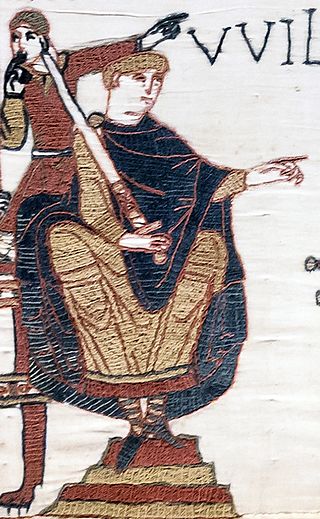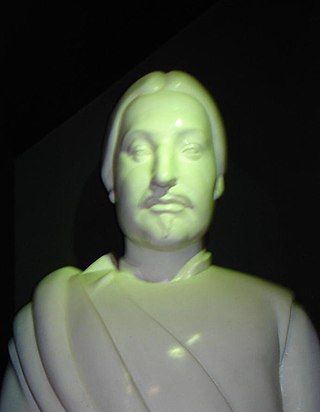Related Research Articles
William I may refer to:

William the Lion, sometimes styled William I and also known by the nickname Garbh, 'the Rough', reigned as King of Scots from 1165 to 1214. His 48-year-long reign was the second longest in Scottish history, and the longest for a Scottish monarch before the Union of the Crowns in 1603.

William is a masculine given name of Germanic origin. It became very popular in the English language after the Norman conquest of England in 1066, and remained so throughout the Middle Ages and into the modern era. It is sometimes abbreviated "Wm." Shortened familiar versions in English include Will, Wills, Willy, Willie, Liam, Bill, and Billy. A common Irish form is Liam. Scottish diminutives include Wull, Willie or Wullie. Female forms are Willa, Willemina, Wilma and Wilhelmina.
William of Mar, also known by the name Uilleam mac Dhonnchaidh, was the mormaer of Mar in medieval Scotland from 1244 to 1276. His father was Donnchadh of Mar.

Fearchar of Ross or Ferchar mac in tSagairt, was the first of the Scottish Ó Beólláin family who received by Royal Grant the lands and Title of Mormaer or Earl of Ross (1223–1251) we know of from the thirteenth century, whose career brought Ross into the fold of the Scottish kings for the first time, and who is remembered as the founder of the Earldom of Ross.
William I, Earl of Ross was ruler of the province of Ross in northern Scotland.

William II, Earl of Ross was ruler of the province of Ross in northern Scotland, and a prominent figure in the Wars of Scottish Independence.
WilliamIII, 5th Earl of Ross was a fourteenth-century Scottish nobleman. He was the fifth O’Beolan earl of Ross, descending from the founder of the line, Fearchar of Ross.
Euphemia I, also called Euphemia of Ross and Euphemia Ross, and sometimes incorrectly styled Euphemia Leslie and Euphemia Stewart, was a Countess of Ross in her own right.

William Comyn was Lord of Badenoch and Earl of Buchan. He was one of the seven children of Richard Comyn, Justiciar of Lothian, and Hextilda of Tynedale. He was born in Scotland, in Altyre, Moray in 1163 and died in Buchan in 1233 where he is buried in Deer Abbey.

Alan Hostarius was the son of Thomas de Lundin, a grandson of Gille Críst, Mormaer of Mar. His mother's name is unknown, but she was almost certainly a daughter of Máel Coluim, Mormaer of Atholl, meaning that Alan was the product of two Gaelic comital families.

Clan Mar is a Scottish clan of the Scottish Lowlands. It is also officially known as the Tribe of Mar. The chiefs of the Clan Mar were the original Earls of Mar, although this title later went via an heiress to the Douglases in the late fourteenth century, and then to the Stewarts before going to the Erskines. The current chief of Clan Mar is Margaret of Mar, Countess.

Archibald was a Scottish prelate best known for involvement in a dispute with the Pope.
Donnchadh of Argyll or Donnchadh mac Dubhghaill was a late 12th and early 13th century Scottish noble. He was the son of Dubhghall mac Somhairle, son of Somhairle mac Gille Bhrighde. He is the first of the MacDougall lords of Argyll to take the title de Argadia, and can be regarded as the founder of the successful MacDougall lordship of Argyll. He was also a prominent builder, notable for his construction of Ardchattan Priory and Dunstaffnage Castle.
Garmoran is an area of western Scotland. It lies at the south-western edge of the present Highland Region. It includes Knoydart, Morar, Moidart, Ardnamurchan, and the Small Isles.
Robert de Fyvie [also de Fyvin] was a prelate based in the Kingdom of Scotland in the last quarter of the 13th century. Perhaps coming from Fyvie in Formartine, from a family of Teesdale origin, Robert was Archdeacon of Ross and a student at the University of Bologna by 1269. In 1275, he was not only a graduate but the new Bishop of Ross, a post he held until his death in the first half of the 1290s.
Alexander Stewart was a 14th-century Scottish bishop. Probably from Menteith, he appears in the sources from the first half of the 1340s, possessing a university degree and holding the position of Archdeacon of Ross. He was active at the papal curia in the second half of the decade as a papal chaplain and administrator, before being provided as Bishop of Ross in 1350, a position he held until his death in 1371.

Aodh is a masculine Irish and Scottish Gaelic given name, which was traditionally anglicized as Hugh. The name means "fire" and was the name of a god in Irish mythology.

Dingwall Castle was a medieval fort and royal castle in the town of Dingwall, eastern Ross-shire, Scotland.
Robert de Munro is the first chief of the Scottish Clan Munro who can be proved by contemporary evidence. He is also by tradition the 8th Baron of Foulis and 11th overall chief of the clan.
References
- ↑ Hanks, Patrick; Hardcastle, Kate; Hodges, Flavia (2006), A Dictionary of First Names, Oxford Paperback Reference (2nd ed.), Oxford: Oxford University Press, p. 410, ISBN 978-0-19-861060-1